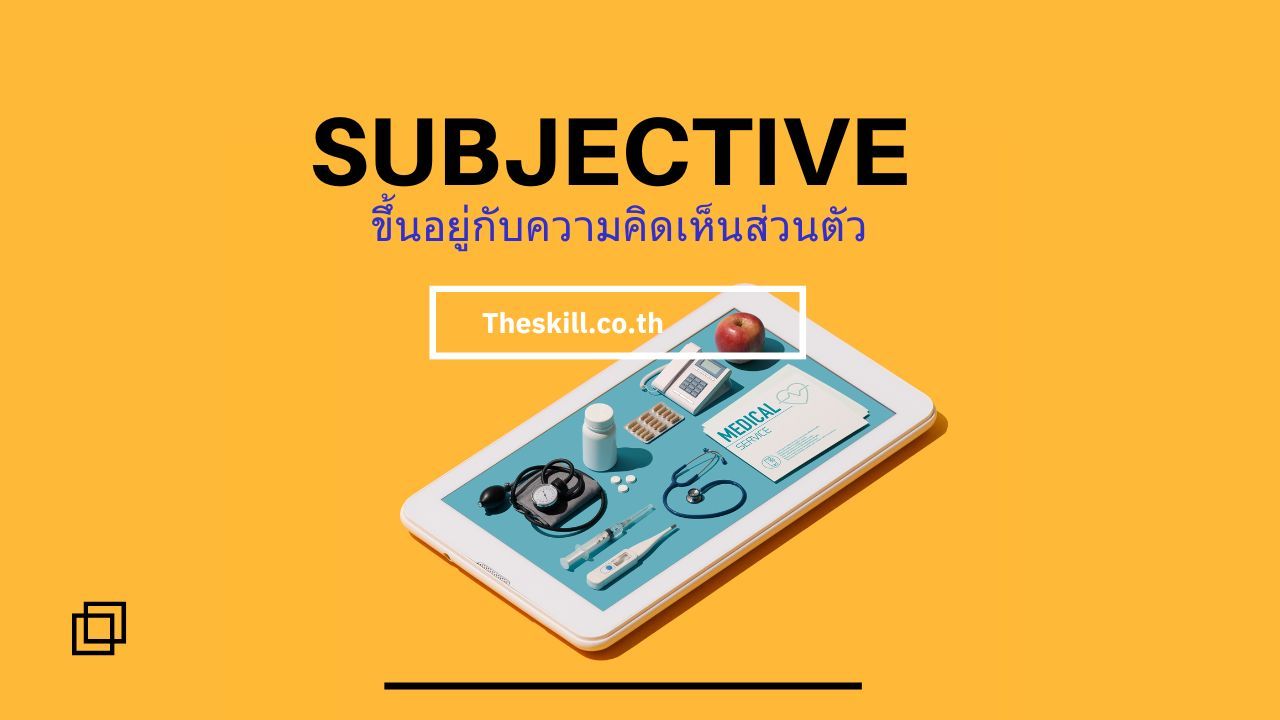Meaning:
Subjective (adjective):Meaning: Based on personal opinions, feelings, interpretations, or perceptions, rather than objective facts or external reality.ขึ้นอยู่กับความคิดเห็นส่วนตัว ความรู้สึก การตีความ หรือการรับรู้ มากกว่าข้อเท็จจริงที่เป็นกลางหรือความเป็นจริงภายนอก
Examples:
- Art appreciation is often subjective, with different viewers having varying emotional responses to a painting.ความชื่นชมในงานศิลปะมักเป็นเรื่องส่วนตัว โดยผู้ชมแต่ละคนมีการตอบสนองทางอารมณ์ต่อภาพวาดต่างกันไป
- The decision to choose a favorite color is subjective and varies from person to person. การตัดสินใจเลือกสีที่ชอบนั้นเป็นเรื่องส่วนตัวและแตกต่างกันไปในแต่ละบุคคล
- Literary analysis involves exploring the subjective interpretations and meanings readers derive from a text. การวิเคราะห์วรรณกรรมเกี่ยวข้องกับการสำรวจการตีความเชิงอัตนัยและความหมายที่ผู้อ่านได้รับจากข้อความ
Synonyms: Personal, emotional, individual, opinion-based, interpretive.
Antonyms: Objective, factual, unbiased, impartial, empirical.
subjective /səbˈdʒɛktɪv/ (adjective)
ความหมายทั่วไป: ที่ขึ้นอยู่กับความคิดเห็น ความรู้สึก หรือประสบการณ์ส่วนตัวของแต่ละบุคคล ไม่ได้อิงจากข้อเท็จจริงภายนอกหรือเป็นกลาง
คำเหล่านี้สื่อถึงสิ่งที่มาจากภายในจิตใจ ความรู้สึก หรือการตีความส่วนตัวของแต่ละบุคคล
- 🤔 personal (ส่วนตัว)
- Her judgment was based on her personal experience, not objective data. (การตัดสินของเธออิงจากประสบการณ์ส่วนตัว ไม่ใช่ข้อมูลที่เป็นกลาง)
- Everyone has their own personal interpretation of art. (ทุกคนมีการตีความงานศิลปะในแบบส่วนตัวของตัวเอง)
- 🤔 personalized (เฉพาะบุคคล)
- The training program was personalized to fit each student's learning style. (โปรแกรมการฝึกอบรมถูกปรับให้เป็นเฉพาะบุคคลเพื่อให้เข้ากับสไตล์การเรียนรู้ของนักเรียนแต่ละคน)
- She prefers a personalized approach to customer service. (เธอชอบวิธีการบริการลูกค้าที่เฉพาะบุคคล)
- 🤔 individual (แต่ละบุคคล)
- Success is an individual concept; it means different things to different people. (ความสำเร็จเป็นแนวคิดของแต่ละบุคคล มันมีความหมายแตกต่างกันไปสำหรับคนแต่ละคน)
- The survey aims to capture individual preferences. (การสำรวจมีเป้าหมายเพื่อรวบรวมความชอบของแต่ละบุคคล)
- 🤔 internal (ภายใน, จากข้างใน)
- His happiness is largely an internal state, not dependent on external factors. (ความสุขของเขาส่วนใหญ่เป็นสภาวะภายใน ไม่ได้ขึ้นอยู่กับปัจจัยภายนอก)
- The company faces some internal challenges that need to be addressed. (บริษัทเผชิญกับความท้าทายภายในบางอย่างที่ต้องได้รับการแก้ไข)
- 🤔 emotional (ทางอารมณ์)
- Her decision was heavily influenced by emotional factors. (การตัดสินใจของเธอได้รับอิทธิพลอย่างมากจากปัจจัยทางอารมณ์)
- Music can evoke strong emotional responses. (ดนตรีสามารถกระตุ้นการตอบสนองทางอารมณ์ที่รุนแรงได้)
- 🤔 instinctive (ตามสัญชาตญาณ)
- Her first reaction was instinctive, not based on careful thought. (ปฏิกิริยาแรกของเธอเป็นไปตามสัญชาตญาณ ไม่ได้อิงจากการคิดอย่างรอบคอบ)
- He had an instinctive understanding of how to connect with people. (เขามีความเข้าใจตามสัญชาตญาณถึงวิธีเชื่อมโยงกับผู้คน)
- 🤔 intuitive (ตามสัญชาตญาณ, หยั่งรู้)
- She made an intuitive decision that turned out to be correct. (เธอตัดสินใจตามสัญชาตญาณซึ่งกลายเป็นสิ่งที่ถูกต้อง)
- Good designers often have an intuitive sense of what users need. (นักออกแบบที่ดีมักจะมีความรู้สึกหยั่งรู้ว่าผู้ใช้ต้องการอะไร)
- 🤔 impressionistic (ตามความรู้สึก/ความประทับใจ)
- His review of the movie was rather impressionistic, focusing on his feelings rather than plot details. (การวิจารณ์ภาพยนตร์ของเขาค่อนข้างตามความรู้สึก โดยเน้นที่ความรู้สึกของเขามากกว่ารายละเอียดของเนื้อเรื่อง)
- The artist's style is very impressionistic, capturing light and mood. (สไตล์ของศิลปินเป็นแบบตามความประทับใจอย่างมาก โดยจับภาพแสงและอารมณ์)
คำเหล่านี้สื่อถึงสิ่งที่ได้รับอิทธิพลจากความคิดเห็นส่วนตัวหรืออคติ ทำให้ไม่เป็นกลาง
- biases biased (มีอคติ)
- The news report was clearly biased towards one political party. (รายงานข่าวมีอคติอย่างชัดเจนต่อพรรคการเมืองหนึ่ง)
- It's important to recognize when information is biased. (สิ่งสำคัญคือการตระหนักว่าเมื่อใดที่ข้อมูลมีอคติ)
- 🚫 prejudiced (ลำเอียง, มีอคติ)
- We must avoid being prejudiced against people from different backgrounds. (เราต้องหลีกเลี่ยงการลำเอียงต่อผู้คนที่มีภูมิหลังแตกต่างกัน)
- A judge should never be prejudiced. (ผู้พิพากษาไม่ควรลำเอียงเลย)
- 😤 bigoted (หัวรุนแรง, มีอคติรุนแรง)
- His bigoted views on immigration were widely condemned. (มุมมองที่หัวรุนแรงของเขาเกี่ยวกับการย้ายถิ่นฐานถูกประณามอย่างกว้างขวาง)
- We should challenge bigoted opinions whenever we encounter them. (เราควรท้าทายความคิดเห็นที่มีอคติรุนแรงเมื่อใดก็ตามที่เราพบเจอ)
- 🌀 idiosyncratic (มีลักษณะเฉพาะตัว, แปลก)
- He has an idiosyncratic way of organizing his books. (เขามีวิธีจัดระเบียบหนังสือที่มีลักษณะเฉพาะตัว)
- Her teaching methods are a bit idiosyncratic, but they work. (วิธีการสอนของเธอค่อนข้างแปลก แต่ก็ใช้ได้ผล)
- ❌ irrational (ไร้เหตุผล)
- Her fear of flying was completely irrational. (ความกลัวการบินของเธอไร้เหตุผลอย่างสิ้นเชิง)
- Making decisions based on irrational emotions can lead to poor outcomes. (การตัดสินใจบนพื้นฐานของอารมณ์ที่ไร้เหตุผลอาจนำไปสู่ผลลัพธ์ที่ไม่ดี)
คำเหล่านี้มักใช้ในภาษาพูดเพื่ออธิบายการตัดสินใจหรือปฏิกิริยาที่มาจากความรู้สึกภายในอย่างรวดเร็ว
- 🧠 gut (มาจากสัญชาตญาณ / ความรู้สึกในใจ)
- He made a gut decision to invest in the startup. (เขาตัดสินใจมาจากสัญชาตญาณที่จะลงทุนในสตาร์ทอัพ)
- I had a gut feeling that something was wrong. (ฉันมีความรู้สึกจากข้างในว่ามีบางอย่างผิดปกติ)
- 🧠 gut reaction (ปฏิกิริยาตามสัญชาตญาณ)
- My gut reaction was to say no, even before I thought about it. (ปฏิกิริยาตามสัญชาตญาณของฉันคือการปฏิเสธ แม้จะยังไม่ได้คิดไตร่ตรอง)
- She trusted her gut reaction when choosing her team members. (เธอเชื่อในปฏิกิริยาตามสัญชาตญาณของเธอเมื่อเลือกสมาชิกในทีม)
คำตรงข้ามของ subjective คือคำที่สื่อถึงความเป็นกลาง ความเป็นจริง และการอิงข้อมูลภายนอก
- 🎯 objective (เป็นกลาง, ตามวัตถุประสงค์)
- We need an objective analysis of the data, free from personal bias. (เราต้องการการวิเคราะห์ข้อมูลที่เป็นกลาง ปราศจากอคติส่วนตัว)
- Scientists strive for objective observations. (นักวิทยาศาสตร์มุ่งมั่นที่จะทำการสังเกตการณ์ที่ตามวัตถุประสงค์)
- ⚖️ impartial (ยุติธรรม, ไม่ลำเอียง)
- The judge must remain impartial throughout the trial. (ผู้พิพากษาต้องคงความเป็นกลางตลอดการพิจารณาคดี)
- An impartial review of the evidence is crucial. (การทบทวนหลักฐานที่ไม่ลำเอียงเป็นสิ่งสำคัญอย่างยิ่ง)







